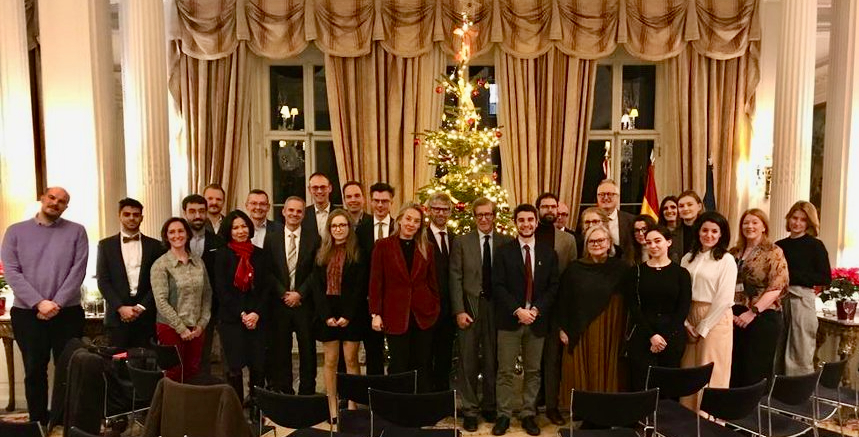EU scientists in UK join forces to set up pan-European professional network
European researchers in the UK are joining forces to set up the first professional network of EU academics in the country, with funding from the European Commission, Embassies and private donors.
The project CONNECTS-UK, which stands for ‘Connecting European Communities Through Science in the UK’, aims to “bridge the gap created by Brexit,” a statement says. It will do so by creating a new pan-European group to support EU-UK scientific collaboration and promote EU academics working in Britain.
Between 2024 and 2025, the project will “organise the EU scientific diaspora” and carry out research on the features and perceptions of the community of EU researchers in the UK, Javier Pardo Díaz, chair of CONNECTS-UK and vice-president of the Society of Spanish Researchers in the UK, told Europe Street.
The project will also analyse how scientific relations between the UK and the EU have changed with regard to international collaborations and mobility, and make recommendations to policy makers.
Another objective is to “organise outreach activities to highlight the contributions of EU researchers to society”, and bring science closer to people, especially younger audiences. “We are planning to disseminate scientific contents not only in English but also in our mother tongues,” Pardo Díaz continued.
“We will organise the EU scientific diaspora by organising networking events and contributing to the establishment of new associations of researchers,” he added.
The initiative is born from the collaboration of the Association of Italian Scientists in the UK (AISUK), the Dutch Academic Network in the UK (DANinUK), the Finnish Science Society in the UK, the French Education and Research Network UK (FERN-UK), the Portuguese Association of Researchers and Students in the UK (PARSUK), the Society of Spanish Researchers in the UK (SRUK/CERU), the Polonium Foundation, and Native Scientists, a non-profit organisation connecting underserved children with scientists.
The project is open to new collaborations, the statement says.
Over half a million euros grant
CONNECTS-UK received a grant of more than half a million euros from the European Commission. The Embassies of France, the Netherlands and Italy, as well as the Spanish Foundation for Science and Technology (FECYT) and the Fundación Banco Santander contributed too.

“We are thrilled to receive this substantial funding from the European Commission for CONNECTS-UK. This support underscores the Commission’s recognition of the critical role that international scientific collaborations play in driving scientific progress and innovation. We are confident that CONNECTS-UK will be a game-changer, opening doors to new research opportunities and strengthening ties between the scientific communities of the EU and the UK,” said Javier Pardo Díaz.
Borja Baselga, director of Fundación Banco Santander, added: “We are delighted to collaborate in this project that will help strengthen scientific collaborations between the United Kingdom and the European Union, promote the development of policies that will support R&D&i, and give visibility to the research of European scientists in the United Kingdom, both among the scientific community and among the wider population.”
“The activities in the frame of the project will strongly help develop the connections among communities of European and British scientists, exchange best practices, launch new cooperation, and bring young people to science,” commented Minh-Hà Pham, head of the higher education, research and innovation department at the French Embassy in the UK.
UK return to Horizon Europe
In the academic year 2020/21, 27,825 EU academics were working in the UK, representing around 19% of all university staff, according to the Higher Education Statistics Agency. The number of EU research students was 4,155 in 2017/18 (14% of the total) and dropped to 1,965 in 2021/22 (7%), after Brexit.
The CONNECTS-UK project was funded following the association of the UK to Horizon Europe, the EU research and innovation programme. As of 1 January 2024, researchers and organisations in the UK will be able to participate again in the programme on equal terms with their counterparts in EU member states.
Claudia Delpero, Europe Street News © all rights reserved
Top photo by Annie Spratt on Unsplash. Photo in text: second meeting of the EU Scientific Diaspora in the UK organised at the Embassy of Spain in London in December 2023, courtesy of SRUK/CERU.
Europe Street News is a news service on the European Union and citizens’ rights. We are fully independent and we are committed to providing factual, accurate and reliable information. As citizens’ rights are at the core of democracy, our website and newsletter are free to read. Please consider making a contribution of your choice using this link, or the menu below, so we can continue and expand our coverage. We are always happy to hear your suggestions and ideas for improvement. Thank you!





